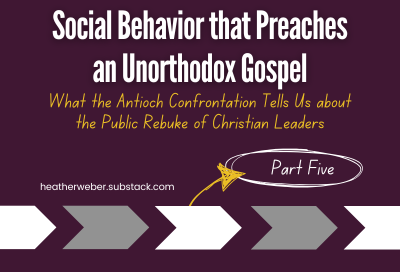Part 5-Social Behavior that Preaches an Unorthodox Gospel
What Peter vs. Paul Teaches Us About the Public Rebuke of Christian Leaders
Earlier this week, I began a series examining the conflict between the apostles Peter and Paul about table fellowship with Gentiles and what it might teach us about the public rebuke of Christian leaders. Read the first installment of the series here and follow along from there.
Yesterday, in part 4, we examined the tone, intensity, substance, and necessity of Paul’s rebuke. Today we take a little segue into the questions, “But what about Matthew 18 Didn’t Jesus say to rebuke in private?”
A NOTE ABOUT MATTHEW 18
At this point, it would be sensible to summarize what we’ve gleaned so far in regard to Paul’s manner, method, and seeming rationale for rebuking Peter publicly. However, I must note the apparent contradiction between Paul’s style of rebuke and Jesus’ teaching about confronting sin in Matthew 18. Students of Scripture may express concern: why didn’t Paul follow Jesus’ instructions to first go in private to a “brother or sister who sins” in order to persuade them to repent (v. 15)? According to Jesus, if the sinning believer is unwilling to listen, only then should a larger group (2-3) come to confront him or her; if that fails to bring about repentance, then the issue of the believer’s sin should be told to the church (v.16-17).
Surely, Paul did not have access to the written gospel of Matthew as we do today, but whether he had access to Jesus’ teachings through Scripture or eyewitness accounts is a moot point because there is no actual contradiction between Paul’s behavior and Jesus’ instruction. In Matthew 18, the sin of the confronted believer is private. In Antioch, Peter’s sin is public: it has already been “told to the church” through his social behavior, which is imitated by others who are being led astray.
Without public rebuke, the sin would be normalized and infect the church community. Anna Case-Winters astutely points out that the context surrounding Jesus’ teaching on confronting sin demonstrates the Father’s concern for “little ones” who may “perish” (Mat 18:14); perhaps, she argues, these “little ones” are actually “members of the church who are weaker in faith and more easily scandalized.”1 The context, then, surrounding Jesus’ teaching on conflict reflects that “the disciples as church leaders must take care not to put any obstacles” in the path of believers who are more susceptible to sin.2 Such obstacles surely include social behavior that perverts the gospel message by encouraging ethnic division. Therefore, we may say that Paul’s behavior is certainly not misaligned with Jesus’ concern for the handling of sin in church community.
A reflection on the series’ content and what we can glean from it about the public rebuke of Christian leaders comes in Part 6 tomorrow. Follow me on Substack, or click the “Subscribe now” button below to have it delivered to your email inbox.
Thanks for reading. I’m a book-obsessed pastor, seminarian, podcaster, and author. For essays and podcasts that come straight to your inbox, subscribe to this Dear Exiles newsletter in the subscription box above. Fun fact: I’m also the author of Dear Boy:, An Epistolary Memoir and the host of the Your Pastor Reads Books podcast.
Anna Case-Winters, Matthew: A Theological Commentary on the Bible (Louisville, KY: Westminster John Knox, 2015), 117.
Ibid, 122.



